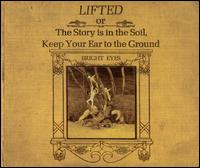

The uninhibited, ambitious musical collages of 22-year-old singer/songwriter Conor Oberst have garnered him some ridiculous acclaim over the past few years. Saddled with that “next Dylan” label that has proved to be the death of so many musicians before him, Oberst didn’t hold anything back on his third Bright Eyes album, Lifted or the Story is in the Soil, Keep Your Ear to the Ground, released on the independent Saddle Creek label.
Oberst’s lack of an editor isn’t just evident in the record’s verbose title; Lifted is absolutely spilling over with words, and they’re presented in drastically different ways, from tinny whispers to screeching scream therapy. Trying to corral all of these sprawling diatribes into digestible songs was obviously the biggest conundrum for Oberst, but he attacks the problem with genuine fervor and priceless honesty, forming what could be whiny melodrama into sweet, authentic lamentation.
Songs like “Waste of Paint” and “Don’t Know When But A Day Is Gonna Come” get dangerously close to sounding like the ostentatious ramblings of a morose teenager, but they’re delivered with such trembling, heartfelt passion that they provide some of Lifted’s most stunning emotional passages.
The album is rooted in the art of stripped-down, injured folk songs like “Paint” and the opening track “The Big Picture,” and it’s these quiet, somber reflections that allow Oberst to take some brilliant artistic leaps with harmony and arrangements, resulting in some of the most personal and beautiful compositions of this past year. “False Advertising” is a string-laden waltz that takes a page from John Lennon’s book of vocal harmony. The dark sexual musings of “Lover I Don’t Have To Love” are anchored by a haunting Fender Rhodes hook. “You Will. You? Will. You? Will. You? Will” is an addictive country sing-a-long.
If there are faults with Lifted, they all have to do with the fact that Conor Oberst writes songs with the express purpose of laying his heart out to dry, to be scrutinized by writers across the globe who honestly couldn’t care less if he’s happy or sad. Sure, there are a few moments that make one think he should be whining to his high school guidance counselor instead of writing songs, but it’s all part and parcel of Oberst’s art – it goes straight from the heart onto the page. After all, in this age of plasticized mass media assaults and water cooler discussions about Super Bowl commericals, the unchecked emotion and inherent innocence of a Bright Eyes album is a rare beast. If nothing else, it should be treasured as a document of truth in a world that pukes up a new fradulent pop star once a week.
Is Oberst the next Bob Dylan? No, and he’s probably not trying to be. It’s plain that his own internal conflicts are what drives him to create, resulting in some of the most tearfully truthful songwriting you’re bound to hear these days.
Appeared in Issue One, 2003, of Traffic East.